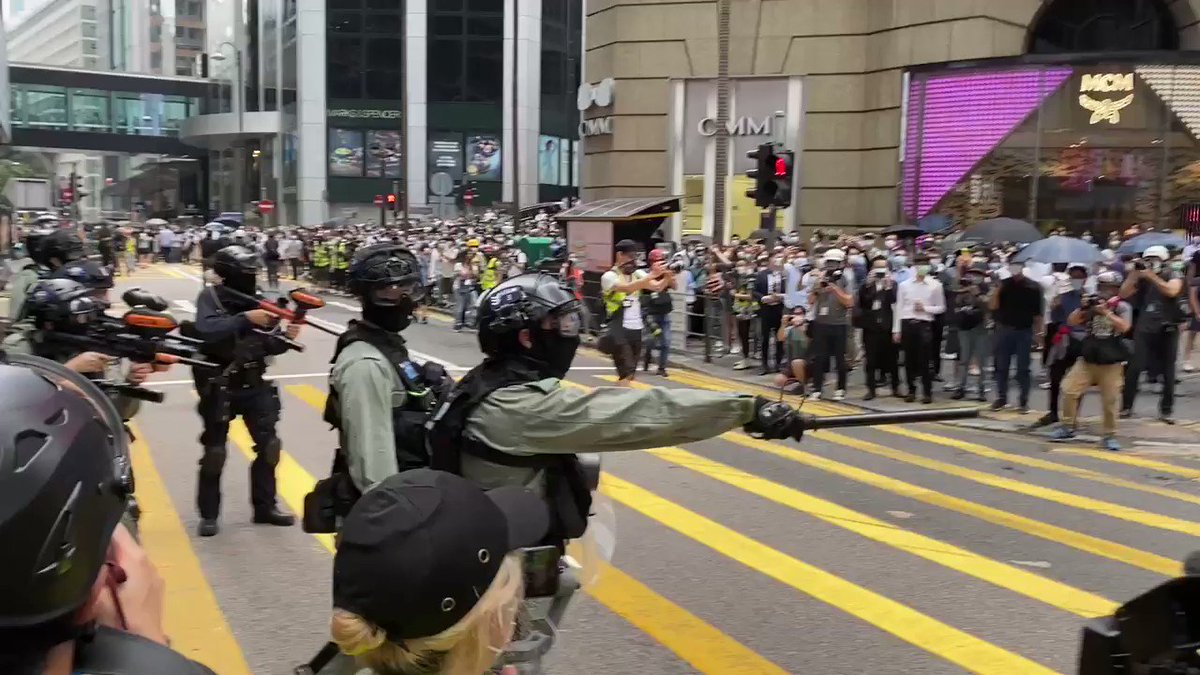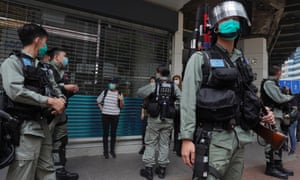Hong Kong crisis: riot police flood city as China protests build
Pro-democracy groups gather to protest against national anthem bill
Helen Davidson, and Verna Yu in Hong Kong
Wed 27 May 2020
Thousands of armed police have flooded the streets of Hong Kong in a show of force to prevent protests against a law criminalising ridicule of China’s national anthem.
At lunchtime rallies, police fired pepper bullets into crowds, and arrested at least 180 protesters.
Protests have also been fuelled by growing anger at Beijing’s increasing interference in the semi-autonomous city, with the National People’s Congress expected to rubber-stamp national security laws on Thursday.
Roads around the Legislative Council building (LegCo), where lawmakers have begun a second reading debate on the anthem law, had been blocked off since at least Tuesday, and pedestrian walkways were cordoned off to all except those with work passes. Shops near LegCo were closed.
In the morning rush hour police in riot gear stopped and searched mainly young people outside Hong Kong’s MTR railway stations, and lined walkways as commuters shuffled past, prompting accusations on social media that the city had become “a police state”.
On social media, protest organisers urged people to “be water” and keep moving throughout the city, but acknowledged it would be difficult to stop the anthem debate without high risk of arrest. “But you can at least make a statement,” said one post.
Crowds regrouped from lunchtime in Mong Kok, where people including schoolchildren were detained; in Causeway Bay, where police arrested at least 180 people for unauthorised gatherings; and Central, where officers fired pepper ball rounds to disperse crowds, and repeatedly charged at protesters.
Police said people had put rubbish on the roads and thrown objects at officers.
“Police had no other option and needed to employ minimal force, including pepper balls to prevent the relevant illegal and violent behaviour,” the force said.
The Guardian view on Hong Kong’s future: China’s doublespeak
Read more
The crowds remained, swearing at police and chanting: “Hong Hong independence, it’s the only way.”
“I’ve come for something I care deeply about – ultimately it’s freedom,” said a 40-year-old lawyer who wished to remain anonymous, citing the national security laws, Beijing encroachment, and a recent report clearing police of wrongdoing.
“If we keep quiet, they can get away with it. I don’t think we can change things but need to make sure our voices are heard.”
 Xinqi Su 蘇昕琪(@XinqiSu)
Xinqi Su 蘇昕琪(@XinqiSu)Rounds of pepper ball were fired at protesters on D’Aguilar St in Central. pic.twitter.com/NCmgspwI0TMay 27, 2020
Shortly before midday, crowds led by thee former legislator Leung Kwok-hung gathered at Admiralty station, near LegCo, where they were told by police to leave or they would be prosecuted. Shouting back, protesters told the police to “be Hongkongers”.
They chanted: “Human rights are higher than the regime” and “Five demands, not one less”, and demanded the government withdraw the national anthem bill and national security legislation.
 Pak Yiu(@pakwayne)
Pak Yiu(@pakwayne)Protesters have now gathered in Hysan Place chanting slogans instead of surrounding legco due to heavy security pic.twitter.com/udjzq7hiT4May 27, 2020
“Of course I need to make my voice heard. They’re forcing this upon us and we can’t fight against them,” said Mrs Lam, a 74-year-old woman.
A 73-year-old woman who gave the surname Cheung said she swam to Hong Kong from China to “escape the dictatorial rule of the CCP [Chinese Communist party]” when she was 15.
“The Communist party is not trustworthy,” she said. “When they say you’re guilty then you’re guilty. Is there still ‘one country, two systems’? Of course we need to fight.”
A district councillor, Roy Tam, said police had pointed pepper spray at him. “Police use force to intimidate people to disperse gatherings,” he said. “Freedom of assembly has gone.”
Elsewhere, protesters gathered in Hysan Place shopping centre shouting slogans, including some calling for independence – a demand previously on the fringe but now growing in popularity.
Police said they had arrested several young people and teenagers for possession of weapons, including petrol bombs. On Facebook police said protesters had thrown barriers on to rail lines, driven slowly to hold up traffic and set fire to rubbish bins.
Opponents say the anthem bill is another step towards authoritarianism, and could be weaponised against pro-democracy activists and legislators.
Under the proposed law, a person commits an offence if they take various actions with “intent to insult” the anthem, such as changing lyrics or music or singing in a “disrespectful way”. It carries financial penalties and jail time of up to three years.
March of the Volunteers is the national anthem of the People’s Republic of China, as well as Hong Kong and Macau, but booing of the anthem at Hong Kong football marches has previously embarrassed Beijing.

FacebookTwitterPinterest Riot police check a pedestrian in Causeway Bay, Hong Kong. Photograph: Vincent Yu/AP
Macau enacted laws in January 2019, but Hong Kong’s stalled amid political gridlock which later descended to violence. The government said it had a constitutional responsibility to enact the law quickly, and has declared it a priority.
It has denied the bill would suppress freedom of speech, and said an offence would occur only if someone expressed their views by publicly and intentionally insulting the national anthem.
Several days have been set aside for debate, and the vote is scheduled for 4 June – the anniversary of the Tiananmen Square massacre and another source of controversy given Hong Kong’s vigil this year won’t be allowed.
On Sunday thousands joined an unauthorised protest against both the anthem bill and Beijing’s plan to impose national security laws, which was quickly cracked down on by police.
Trump ‘displeased’ with proposed national security law
Hong Kong media reported on Wednesday that Beijing had expanded the scope of the draft security law legislation. “Mainland lawyers who have handled national security cases in the past say this change could bring not just individuals, but also organisations under the scope of the law,” RTHK said.
On Tuesday, the US president, Donald Trump, warned he would take action against China if it imposed the laws. Trump didn’t say if it involved sanctions or changes to the city’s special trading status but his press secretary, Kayleigh McEnany, said the president was “displeased”, and it was “hard to see how Hong Kong can remain a financial hub if China takes over”.
The president’s vague warning came hours after his Chinese counterpart, Xi Jinping, said China’s military must increase its preparations for armed confrontations.
“It is necessary to step up preparations for armed combat, to flexibly carry out actual combat military training, and to improve our military’s ability to perform military missions,” he told military officers on the sidelines of the country’s annual Two Sessions political gathering.
The comments, which did not refer to Hong Kong directly, came just a day after the commander of the People’s Liberation Army garrison stationed in Hong Kong said his troops – estimated to number around 10,000 – stood ready to “safeguard” Chinese sovereignty in the city and support national security laws.
Hong Kong crisis: protesters and police clash over new anthem law – video
No comments:
Post a Comment